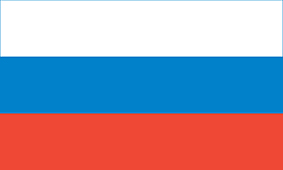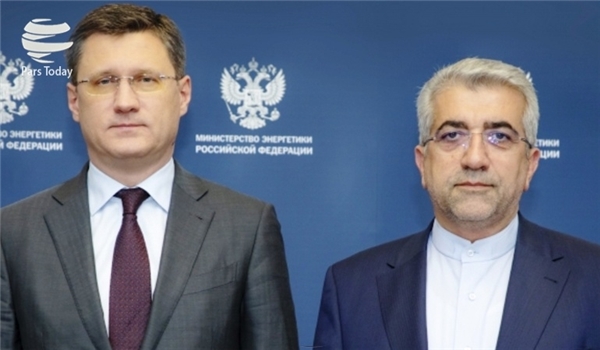
Tehran, Moscow to Further Increase Cooperation


Ardekanian and Novak as the presidents of Iran-Russia Joint Cooperation Commission also dealt with cooperation in different arenas.
In the phone conversation on Friday, they also exchanged views on the date of the upcoming meeting, as the meeting is slated to be held in Tehran soon.
The 14th meeting of Iran-Russia Joint Cooperation Commission was held in Moscow in March 2018.
Ardekanian further pointed out that Iran is to host the 15th meeting of the commission by the end of the current Iranian year (March 21).
He also hailed Russia’s stances, especially after the US unilateral exit from nuclear deal, hoping that bilateral relations would further improve.
In a related front, Iranian Ambassador to Russia Mehdi Sanayee said that Tehran-Moscow ties became stronger and bilateral relations increased after the two countries saw common interests in regional and international developments.
Sanayee described the development of Iran-Russia political and security relations after signing of the Joint Comprehensive Plan of Action (JCPOA) as unparalleled, adding that the bilateral ties have yet to use all the potentials to further develop.
He made the remarks in a panel at the Institute for Iran-Eurasia Studies (IRAS) in Tehran.
At the panel, Sanayee first addressed the latest status of relations between Iran and Russia in political, economic and cultural fields, saying relations between the two countries have undergone a major transformation as a result of the growth of mutual needs and regional conditions.
According to Sanayee, since the signing of the 2015 nuclear deal also known as the JCPOA, economic relations between Iran and Russia have multiplied, but the developing relations have yet to reach the desired levels using potentials.
The Iranian diplomat also hailed Iran's cultural activities in Russia. Meanwhile, he described the development of Iran-Russia political, security relations as unparalleled.
The two countries' common approaches and perspectives towards global trends and shared regional interests, specially in relation to the Middle East developments, were the most important force behind the development of political relations between the two countries, according to the Iranian ambassador.
In a related front, earlier on January 16, Sanayee and Russian Deputy Foreign Minister Grigory Karasin discussed enhancement of cooperation in the Caucasus region, reiterating that the two countries will further develop their bilateral relations and cooperation in the Caucasus region where the two sides have shared interests and see grounds for mutual cooperation.
During the meeting, both sides voiced hope that level of bilateral relations would be further increased in the said areas.
Russia’s ties with Central Asian and Caucasus states and prospects of bilateral relations in various fields were among the other topics discussed during the meeting.
Iran and Russia have established strong relations on areas of security, counter-terrorism, and defense in the past couple of years.
In a related front on December 24, a delegation of the Russian defense ministry led by General Osipov arrived in Iran to take part in a second session of the Russian-Iranian working group for the implementation of a mutual agreement on military cooperation.
The agreement was signed in January 2015. It was inked by Russian Defense Minister Sergey Shoigu and his then Iranian counterpart General Hossein Dehqan.
The Russian minister said back then that the agreement had laid "the theoretical groundwork for military cooperation".
In relevant remarks on December 25, Chief of Staff of the Iranian Armed Forces Major General Mohammad Hossein Baqeri underlined the need for Tehran and Moscow to further increase their military cooperation, adding that both countries were determined to confront existing threats.
"Success of the two countries' Armed Forces in the process of confronting terrorism in Syria and the failure of Takfiri terrorists and their supporters in the region indicates Iran and Russia's will and capacities to confront the existing threats," General Baqeri said in a meeting with General Osipov in Tehran.
"The geopolitical and geostrategic capacities of Iran and Russia necessitate the two countries' Armed Forces to devise and develop fields of cooperation through a long-term view, and manage and plan for them within the framework of the agreements made by the joint military commission," he added.
During the meeting, General Osipov referred to the age-old relations between Iran and Russia, and stressed the abundant areas and capacities existing for mutual cooperation.


Trump weighs using $2 billion in CHIPS Act funding for critical minerals

Codelco cuts 2025 copper forecast after El Teniente mine collapse

Electra converts debt, launches $30M raise to jumpstart stalled cobalt refinery

Barrick’s Reko Diq in line for $410M ADB backing

Abcourt readies Sleeping Giant mill to pour first gold since 2014

Nevada army depot to serve as base for first US strategic minerals stockpile

SQM boosts lithium supply plans as prices flick higher

Viridis unveils 200Mt initial reserve for Brazil rare earth project

Tailings could meet much of US critical mineral demand – study

Kyrgyzstan kicks off underground gold mining at Kumtor

Kyrgyzstan kicks off underground gold mining at Kumtor

KoBold Metals granted lithium exploration rights in Congo

Freeport Indonesia to wrap up Gresik plant repairs by early September

Energy Fuels soars on Vulcan Elements partnership

Northern Dynasty sticks to proposal in battle to lift Pebble mine veto

Giustra-backed mining firm teams up with informal miners in Colombia

Critical Metals signs agreement to supply rare earth to US government-funded facility

China extends rare earth controls to imported material

Galan Lithium proceeds with $13M financing for Argentina project

Kyrgyzstan kicks off underground gold mining at Kumtor

Freeport Indonesia to wrap up Gresik plant repairs by early September

Energy Fuels soars on Vulcan Elements partnership

Northern Dynasty sticks to proposal in battle to lift Pebble mine veto

Giustra-backed mining firm teams up with informal miners in Colombia

Critical Metals signs agreement to supply rare earth to US government-funded facility

China extends rare earth controls to imported material

Galan Lithium proceeds with $13M financing for Argentina project

Silver price touches $39 as market weighs rate cut outlook

















